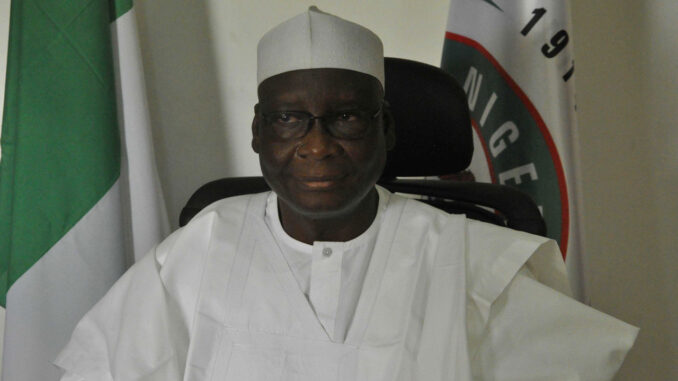
A disclosure made the other day by the Director-General of the National Orientation Agency (NOA), Dr. Garba Abari, that the agency had established ‘Integrity Clubs’ in 1000 schools nationwide, in its bid to purge the nation of corruption, should raise some curiosity and mixed feelings. Given the gangrenous state of corruption and moral decadence in every facet of the society, this project seems to express genuine concern for national moral rebirth. It smacks of an initiative that underscores the ambitious nature and reformist tendencies of its masterminds. However, just as the way to hell is paved with good intentions, the proposal from high quarters does not seem to impress on Nigerians how integrity clubs in schools at this time will purge the nation of corruption.
A key aspect of the success of this project rests on its contribution to school curriculum and pedagogic quality, for it seeks to revolutionalise the moral order by making effective teaching of civic education the foundation of the national ethics and integrity policy. Through this project, Abari claimed, young Nigerians would grow with a new ethical orientation that would address the problem of corruption. Whilst the project did not deny the existence of ongoing initiatives with the same goal, Abari believed that it is in the development of capacity and teaching resources that the NOA could fill the gaps by providing “capacitated teachers” of civics and ethics.
That the NOA has officially brought the issue of ethics and integrity to the schools is a commendable initiative. If only for the fact of reminding Nigerians of their misplaced priority, the Integrity Club project deserves close attention. After all, no educational system is worthy of being described as well-rounded if it does not accommodate the cultivation of the mind for moral virtue and ethical values as a fundamental part of its curriculum. So, it is consistent with good intentions to think of a new ethical order from the school.
However, one of the challenges confronting a project like this is the practicability of integrity clubs as agencies of corruption busting. Although the goal of moral education is very laudable, the implementation tends to be far-fetched. What are the markers of the goal of this project? Are the schools testing grounds for a greater project? As proponents of George T. Doran’s management theory would want us to ask, are the goal and objectives of the established clubs specific, measurable, achievable, realistic and time-bound?
Although well-meaning and informed Nigerians have reiterated the urgent need for teaching of ethics and civics in schools, the fact is that the teaching of these subjects have been going on for years. Moral instructions and civics are already taught subjects in the primary and secondary school respectively, while ethics in its various forms are encountered by students of tertiary institutions. Moreover, there are associations and clubs such as Rotaract, Jaycees, AIESEC, amongst others, taking on the responsibility of inculcating integrity in schools. Besides, faith-based organisations have moral and ethical precepts enshrined in their doctrines and injunctions. Therefore, it is not the case that teaching these subjects would bring about any moral reprieve. The fundamental issue is the refinement of the mind to do the right thing; and this comes from practice, practice long pursued in such a manner that it becomes a habit.
Another curious issue for this administration concerns the moral gravitas to establish integrity clubs when the superintending agencies are steeped in the morass of corruption that oils public service. The moral albatross here is that a government that frolics in the cesspool of corruption, an administration that wears impunity like a life jacket cannot be trusted with inculcating integrity. For skeptics who cannot trust a good product to come from a bad designer, the establishment of integrity clubs seems like another conduit pipe for money-sharing, or, at best, exuberant sloganeering. And to prove such cynics wrong is a task, which the NOA, in collaboration with the Independent Corrupt Practices Commission (ICPC), must take on headlong.
If the NOA and its anti-corruption sister body must be taken seriously, they would have to transcend sloganeering and fleeting crusading, and channel their efforts in aggressively supporting projects geared towards moral rearmament. They must be visible in an influential way in forcefully fighting corruption in all its ramification and condemning practices that negate or frustrate the cultivation of excellence in character. The NOA, on its part, should do well to emphasise wholesome or total moral rebirth as its foundation for ethics and integrity policy for this country. The agency should disabuse the minds of Nigerians by presenting a more extensive outlook to corruption beyond financial and economic crimes. Its campaign against corruption should target excellence of character rather than legal cum political correctness.
It is, therefore, worth reiterating that good example is the best teacher of ethics and moral virtues. Moral values and virtues are not technical proficiency tests that are taught, passed or failed, and for which scores are awarded. Living the morally virtuous life is a lived experience, a learned behaviour from socialisation. Families should pursue the good life and set worthy examples for their children and wards to emulate. Community luminaries and public officers should cultivate a life of virtue and dignity, whilst the pretentious distinction made between private and public life of public figures should be discarded for genuine openness that sets worthwhile examples.
END

Be the first to comment